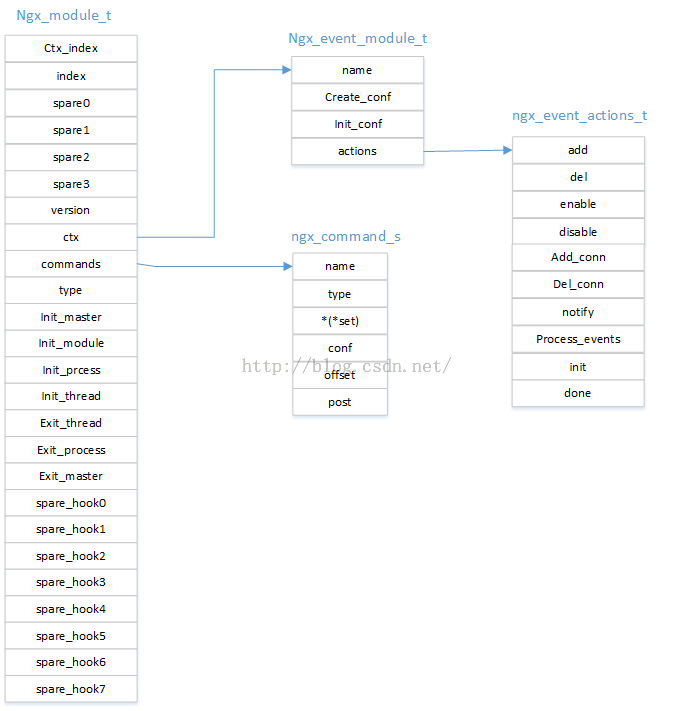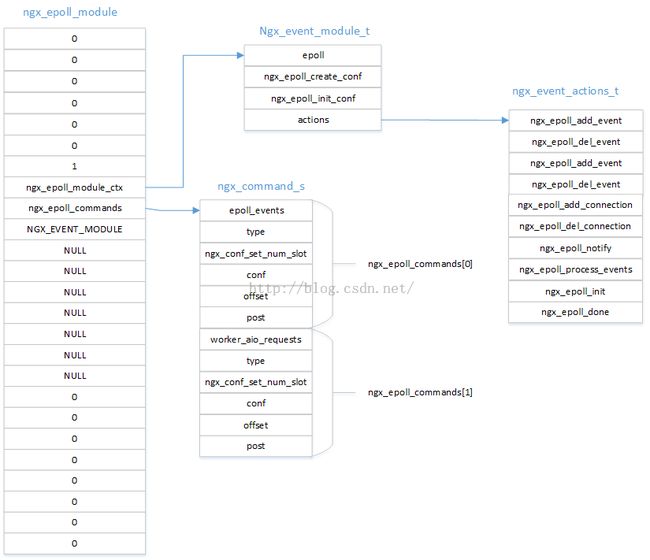nginx event 模块解析
几个相关的数据类型
typedef struct {
ngx_str_t name;
void *(*create_conf)(ngx_cycle_t *cycle);
char *(*init_conf)(ngx_cycle_t *cycle, void *conf);
} ngx_core_module_t;
static ngx_core_module_t ngx_events_module_ctx = {
ngx_string("events"),
NULL,
ngx_event_init_conf
};
struct ngx_command_s {
ngx_str_t name;
ngx_uint_t type;
char *(*set)(ngx_conf_t *cf, ngx_command_t *cmd, void *conf);
ngx_uint_t conf;
ngx_uint_t offset;
void *post;
};
#define ngx_null_command { ngx_null_string, 0, NULL, 0, 0, NULL }
static ngx_command_t ngx_events_commands[] = {
{ ngx_string("events"),
NGX_MAIN_CONF|NGX_CONF_BLOCK|NGX_CONF_NOARGS,
ngx_events_block,
0,
0,
NULL },
ngx_null_command
};
#define NGX_MODULE_V1 0, 0, 0, 0, 0, 0, 1
#define NGX_MODULE_V1_PADDING 0, 0, 0, 0, 0, 0, 0, 0
struct ngx_module_s {
ngx_uint_t ctx_index;
ngx_uint_t index;
ngx_uint_t spare0;
ngx_uint_t spare1;
ngx_uint_t spare2;
ngx_uint_t spare3;
ngx_uint_t version;
void *ctx;
ngx_command_t *commands;
ngx_uint_t type;
ngx_int_t (*init_master)(ngx_log_t *log);
ngx_int_t (*init_module)(ngx_cycle_t *cycle);
ngx_int_t (*init_process)(ngx_cycle_t *cycle);
ngx_int_t (*init_thread)(ngx_cycle_t *cycle);
void (*exit_thread)(ngx_cycle_t *cycle);
void (*exit_process)(ngx_cycle_t *cycle);
void (*exit_master)(ngx_cycle_t *cycle);
uintptr_t spare_hook0;
uintptr_t spare_hook1;
uintptr_t spare_hook2;
uintptr_t spare_hook3;
uintptr_t spare_hook4;
uintptr_t spare_hook5;
uintptr_t spare_hook6;
uintptr_t spare_hook7;
};
ngx_module_t *ngx_modules[] = {
...
...
&ngx_events_module,
&ngx_event_core_module,
&ngx_epoll_module,
...
}
ngx_module_t ngx_events_module = {
NGX_MODULE_V1,
&ngx_events_module_ctx, /* module context */
ngx_events_commands, /* module directives */
NGX_CORE_MODULE, /* module type */
NULL, /* init master */
NULL, /* init module */
NULL, /* init process */
NULL, /* init thread */
NULL, /* exit thread */
NULL, /* exit process */
NULL, /* exit master */
NGX_MODULE_V1_PADDING
};
ngx_module_t ngx_event_core_module = {
NGX_MODULE_V1,
&ngx_event_core_module_ctx, /* module context */
ngx_event_core_commands, /* module directives */
NGX_EVENT_MODULE, /* module type */
NULL, /* init master */
ngx_event_module_init, /* init module */
ngx_event_process_init, /* init process */
NULL, /* init thread */
NULL, /* exit thread */
NULL, /* exit process */
NULL, /* exit master */
NGX_MODULE_V1_PADDING
};
ngx_module_t ngx_epoll_module = {
NGX_MODULE_V1,
ngx_epoll_module_ctx, /* module context */
ngx_epoll_commands, /* module directives */
NGX_EVENT_MODULE, /* module type */
NULL, /* init master */
NULL, /* init module */
NULL, /* init process */
NULL, /* init thread */
NULL, /* exit thread */
NULL, /* exit process */
NULL, /* exit master */
NGX_MODULE_V1_PADDING
};
ngx_event_module_t ngx_epoll_module_ctx = {
&epoll_name,
ngx_epoll_create_conf, /* create configuration */
ngx_epoll_init_conf, /* init configuration */
{
ngx_epoll_add_event, /* add an event */
ngx_epoll_del_event, /* delete an event */
ngx_epoll_add_event, /* enable an event */
ngx_epoll_del_event, /* disable an event */
ngx_epoll_add_connection, /* add an connection */
ngx_epoll_del_connection, /* delete an connection */
#if (NGX_HAVE_EVENTFD)
ngx_epoll_notify, /* trigger a notify */
#else
NULL, /* trigger a notify */
#endif
ngx_epoll_process_events, /* process the events */
ngx_epoll_init, /* init the events */
ngx_epoll_done, /* done the events */
}
};
static void *
ngx_epoll_create_conf(ngx_cycle_t *cycle)
{
ngx_epoll_conf_t *epcf;
epcf = ngx_palloc(cycle->pool, sizeof(ngx_epoll_conf_t));
if (epcf == NULL) {
return NULL;
}
epcf->events = NGX_CONF_UNSET;
epcf->aio_requests = NGX_CONF_UNSET;
return epcf;
}
static char *
ngx_epoll_init_conf(ngx_cycle_t *cycle, void *conf)
{
ngx_epoll_conf_t *epcf = conf;
ngx_conf_init_uint_value(epcf->events, 512);
ngx_conf_init_uint_value(epcf->aio_requests, 32);
return NGX_CONF_OK;
}
1. 解析nginx配置文件nginx.conf中的event block,如:
events {
use epoll;
worker_connections 1024;
}
当解析到events这个关键字时,会回调ngx_events_commands中的设置函数ngx_events_block
static char *
ngx_events_block(ngx_conf_t *cf, ngx_command_t *cmd, void *conf)
{
char *rv;
void ***ctx;
ngx_uint_t i;
ngx_conf_t pcf;
ngx_event_module_t *m;
if (*(void **) conf) {
return "is duplicate";
}
/* count the number of the event modules and set up their indices */
/*统计模块类型为event模块的数量,并记录,ctx_index就是用来记录每个模块内部所属的计数值,
总共有四种模块类型:1.core模块;2.http模块;3.event模块 4.mail模块*/
ngx_event_max_module = 0;
for (i = 0; ngx_modules[i]; i++) {
if (ngx_modules[i]->type != NGX_EVENT_MODULE) {
continue;
}
ngx_modules[i]->ctx_index = ngx_event_max_module++;
}
/*申请一个指针*/
ctx = ngx_pcalloc(cf->pool, sizeof(void *));
if (ctx == NULL) {
return NGX_CONF_ERROR;
}
/*指针内容也是一个指针内存数据*/
*ctx = ngx_pcalloc(cf->pool, ngx_event_max_module * sizeof(void *));
if (*ctx == NULL) {
return NGX_CONF_ERROR;
}
/*返回值conf,将配置信息存在conf中*/
*(void **) conf = ctx;
for (i = 0; ngx_modules[i]; i++) {
/*跳过非NGX_EVENT_MODULE类型的模块*/
if (ngx_modules[i]->type != NGX_EVENT_MODULE) {
continue;
}
/*目前只有两个类型为NGX_EVENT_MODULE的模块
1. ngx_event_core_module ----- 对应的ctx为ngx_event_core_module_ctx
2. ngx_epoll_module ---- 对应的ctx为ngx_epoll_module_ctx
*/
m = ngx_modules[i]->ctx;
/*如果event模块的create_conf钩子函数不为空,则为该模块创建配置内存数据,如ngx_epoll_create_conf*/
if (m->create_conf) {
(*ctx)[ngx_modules[i]->ctx_index] = m->create_conf(cf->cycle);
if ((*ctx)[ngx_modules[i]->ctx_index] == NULL) {
return NGX_CONF_ERROR;
}
}
}
/*cf指针就是指向配置文件的原始数据*/
pcf = *cf;
cf->ctx = ctx; //这里的cf->ctx被赋值成了一个新分配的数组配置文件
cf->module_type = NGX_EVENT_MODULE;
cf->cmd_type = NGX_EVENT_CONF;
/*events是一个block指令,下面还有其他的配置项,如 use epoll,worker_connections
调用ngx_conf_parse函数解析子配置项*/
rv = ngx_conf_parse(cf, NULL);
*cf = pcf;
if (rv != NGX_CONF_OK)
return rv;
for (i = 0; ngx_modules[i]; i++) {
if (ngx_modules[i]->type != NGX_EVENT_MODULE) {
continue;
}
m = ngx_modules[i]->ctx;
/*如果event模块的init_conf钩子函数不为空,则为该模块初始化配置内存数据,如ngx_epoll_init_conf*/
if (m->init_conf) {
rv = m->init_conf(cf->cycle, (*ctx)[ngx_modules[i]->ctx_index]);
if (rv != NGX_CONF_OK) {
return rv;
}
}
}
return NGX_CONF_OK;
}
当创建了一个worker进程ngx_worker_process_cycle后,worker进程首先就会做进程的初始化工作ngx_worker_process_init,此时会调用ngx_event_process_init函数。
static ngx_int_t
ngx_event_process_init(ngx_cycle_t *cycle)
{
ngx_uint_t m, i;
ngx_event_t *rev, *wev;
ngx_listening_t *ls;
ngx_connection_t *c, *next, *old;
ngx_core_conf_t *ccf;
ngx_event_conf_t *ecf;
ngx_event_module_t *module;
/*获取core模块和event模块的配置信息*/
ccf = (ngx_core_conf_t *) ngx_get_conf(cycle->conf_ctx, ngx_core_module);
ecf = ngx_event_get_conf(cycle->conf_ctx, ngx_event_core_module);
/*master进程打开,worker进程大于1,已经创建了accept_mutex
才打开accept互斥体*/
if (ccf->master && ccf->worker_processes > 1 && ecf->accept_mutex) {
ngx_use_accept_mutex = 1; //使用互斥体
ngx_accept_mutex_held = 0; //是否获得accept互斥体
ngx_accept_mutex_delay = ecf->accept_mutex_delay; //争抢互斥体失败后,等待下次争抢时间间
} else {
ngx_use_accept_mutex = 0;
}
#if (NGX_WIN32)
/*
* disable accept mutex on win32 as it may cause deadlock if
* grabbed by a process which can't accept connections
*/
ngx_use_accept_mutex = 0;
#endif
ngx_queue_init(&ngx_posted_accept_events);
ngx_queue_init(&ngx_posted_events);
//初始化计数器,此处将会创建一颗红黑树,来维护计时器,
if (ngx_event_timer_init(cycle->log) == NGX_ERROR) {
return NGX_ERROR;
}
for (m = 0; ngx_modules[m]; m++) {
/*循环模块,跳过模块类型为非NGX_EVENT_MODULE类型的模块*/
if (ngx_modules[m]->type != NGX_EVENT_MODULE) {
continue;
}
/*不是use配置指令指定的模块跳过,默认是epoll,即如果在event block中使用了use epoll,才会走下去*/
if (ngx_modules[m]->ctx_index != ecf->use) {
continue;
}
module = ngx_modules[m]->ctx;
/*这里的module为epoll模块,init函数就是ngx_epoll_init*/
if (module->actions.init(cycle, ngx_timer_resolution) != NGX_OK) {
/* fatal */
exit(2);
}
break;
}
#if !(NGX_WIN32)
if (ngx_timer_resolution && !(ngx_event_flags & NGX_USE_TIMER_EVENT)) {
struct sigaction sa;
struct itimerval itv;
ngx_memzero(&sa, sizeof(struct sigaction));
sa.sa_handler = ngx_timer_signal_handler;
sigemptyset(&sa.sa_mask);
if (sigaction(SIGALRM, &sa, NULL) == -1) {
ngx_log_error(NGX_LOG_ALERT, cycle->log, ngx_errno,
"sigaction(SIGALRM) failed");
return NGX_ERROR;
}
itv.it_interval.tv_sec = ngx_timer_resolution / 1000;
itv.it_interval.tv_usec = (ngx_timer_resolution % 1000) * 1000;
itv.it_value.tv_sec = ngx_timer_resolution / 1000;
itv.it_value.tv_usec = (ngx_timer_resolution % 1000 ) * 1000;
if (setitimer(ITIMER_REAL, &itv, NULL) == -1) {
ngx_log_error(NGX_LOG_ALERT, cycle->log, ngx_errno,
"setitimer() failed");
}
}
if (ngx_event_flags & NGX_USE_FD_EVENT) {
struct rlimit rlmt;
if (getrlimit(RLIMIT_NOFILE, &rlmt) == -1) {
ngx_log_error(NGX_LOG_ALERT, cycle->log, ngx_errno,
"getrlimit(RLIMIT_NOFILE) failed");
return NGX_ERROR;
}
cycle->files_n = (ngx_uint_t) rlmt.rlim_cur;
cycle->files = ngx_calloc(sizeof(ngx_connection_t *) * cycle->files_n,
cycle->log);
if (cycle->files == NULL) {
return NGX_ERROR;
}
}
#endif
/*创建全局的ngx_connection_t数组,保存所有的connection
由于这个过程是在各个worker进程中执行的,所以每个worker都有自己的connection数组*/
cycle->connections =
ngx_alloc(sizeof(ngx_connection_t) * cycle->connection_n, cycle->log);
if (cycle->connections == NULL) {
return NGX_ERROR;
}
c = cycle->connections;
//创建一个读事件数组
cycle->read_events = ngx_alloc(sizeof(ngx_event_t) * cycle->connection_n,
cycle->log);
if (cycle->read_events == NULL) {
return NGX_ERROR;
}
rev = cycle->read_events;
for (i = 0; i < cycle->connection_n; i++) {
rev[i].closed = 1;
rev[i].instance = 1;
}
//创建一个写事件数组
cycle->write_events = ngx_alloc(sizeof(ngx_event_t) * cycle->connection_n,
cycle->log);
if (cycle->write_events == NULL) {
return NGX_ERROR;
}
wev = cycle->write_events;
for (i = 0; i < cycle->connection_n; i++) {
wev[i].closed = 1;
}
i = cycle->connection_n;
next = NULL;
//初始化整个connection数组
do {
i--;
c[i].data = next;
c[i].read = &cycle->read_events[i];
c[i].write = &cycle->write_events[i];
c[i].fd = (ngx_socket_t) -1;
next = &c[i];
} while (i);
/*初始化完成后,free_connections指向connection数组的第一个*/
cycle->free_connections = next;
/*初始化后,空闲的连接数等于配置的连接数*/
cycle->free_connection_n = cycle->connection_n;
/* for each listening socket */
ls = cycle->listening.elts;
for (i = 0; i < cycle->listening.nelts; i++) {
/*从connection数组中取得一个空闲的位置slot*/
c = ngx_get_connection(ls[i].fd, cycle->log);
if (c == NULL) {
return NGX_ERROR;
}
c->log = &ls[i].log;
c->listening = &ls[i];
ls[i].connection = c;
rev = c->read;
rev->log = c->log;
rev->accept = 1; //读时间发生,调用accept
#if (NGX_HAVE_DEFERRED_ACCEPT)
rev->deferred_accept = ls[i].deferred_accept;
#endif
if (!(ngx_event_flags & NGX_USE_IOCP_EVENT)) {
if (ls[i].previous) {
/*
* delete the old accept events that were bound to
* the old cycle read events array
*/
old = ls[i].previous->connection;
if (ngx_del_event(old->read, NGX_READ_EVENT, NGX_CLOSE_EVENT)
== NGX_ERROR)
{
return NGX_ERROR;
}
old->fd = (ngx_socket_t) -1;
}
}
#if (NGX_WIN32)
if (ngx_event_flags & NGX_USE_IOCP_EVENT) {
ngx_iocp_conf_t *iocpcf;
rev->handler = ngx_event_acceptex;
if (ngx_use_accept_mutex) {
continue;
}
if (ngx_add_event(rev, 0, NGX_IOCP_ACCEPT) == NGX_ERROR) {
return NGX_ERROR;
}
ls[i].log.handler = ngx_acceptex_log_error;
iocpcf = ngx_event_get_conf(cycle->conf_ctx, ngx_iocp_module);
if (ngx_event_post_acceptex(&ls[i], iocpcf->post_acceptex)
== NGX_ERROR)
{
return NGX_ERROR;
}
} else {
rev->handler = ngx_event_accept;
if (ngx_use_accept_mutex) {
continue;
}
if (ngx_add_event(rev, NGX_READ_EVENT, 0) == NGX_ERROR) {
return NGX_ERROR;
}
}
#else
/*注册套接字读事件的回调函数*/
rev->handler = ngx_event_accept;
//使用了accept_mutex,暂时不将监听套接字放入epoll中,而是
//等到worker抢到accept互斥体后,再放入epoll,避免惊群的发生
if (ngx_use_accept_mutex) {
continue;
}
if (ngx_event_flags & NGX_USE_RTSIG_EVENT) {
if (ngx_add_conn(c) == NGX_ERROR) {
return NGX_ERROR;
}
} else {
//没有使用accept互斥体,那么就将此监听套接字放入epoll中。
if (ngx_add_event(rev, NGX_READ_EVENT, 0) == NGX_ERROR) {
return NGX_ERROR;
}
}
#endif
}
return NGX_OK;
}


